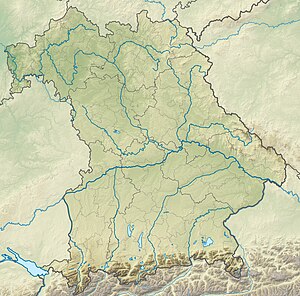Lower Bavarian Bath Dieck – Wikipedia
|
Lower Bavarian Bath Dieck (Bavaria) |
Under the Lower Bavarian [first] or that Rottaler Bäderdreieck Understand the three health resorts of Bad Füssing, Bad Griesbach and Bad Birnbach.
The spas are located in the district of Passau (Bad Füssing, Bad Griesbach) or in the Rottal-Inn district (Bad Birnbach) in the lower Rottal. In total there are five thermal baths in the region, three of them in Bad Füssing and one in Bad Birnbach and Bad Griesbach. [2]
The thermal water comes from an approximately 1000 meter deep occurrence that extends from Regensburg to Linz. In this area there are also the Upper Austrian spa towns of Geinberg and Bad Schallerbach. [3]
The three health resorts are connected to the Passau – Mühldorf (Inn) railway line known as the “Rottalbahn” every hour to the railway network of the Südostbayernbahn, whereby a train station is not in the immediate area in any of the health resorts, but a few kilometers away.
For the first time on thermal water, they bumped into Safferstetten, a today’s district of Bad Füssing, when Reichsbodenforschung carried out oil and gas bores in 1938. However, the use of the water was initially banned in order not to compete with the existing spa towns in Northern Bohemia. After a scientific report confirmed the healing effect of the thermal water in 1953, Kurtourism in Füssing developed from 1955. The use rights on the water went to private from the Bavarian mineral oil industry in 1955 Thermalbad Füssing GmbH above. Since the rather small community itself was unable to promote the development, the Free State of Bavaria began to promote the place. In 1963 a second hole was carried out by the Free State, in 1964 another from private hand, so that the place now had three thermal sources. In 1969 Füssing was awarded the title “Bad”. [4] [5]
Griesbach was appointed resort in 1969 and was a climatic health resort in 1973. In 1973, thermal water was first discovered at drilling. Since an expert opinion confirmed the healing effect of the water, the location was now able to develop into a thermal water health resort. In 1985 the title “Bad” was awarded the spa center, which was then built, and in 2000 also the entire city of Griesbach. [6] [7]
In Birnbach, thermal water was also discovered in 1973 at holes and the construction of a thermal bath was started. In 1987 the location “Bad” was awarded. [8] [9]
The area forms the most tourist region of Lower Bavaria and one of the most tourism of Bavaria. Bad Füssing can have one of the highest number of overnight stays in all German health resorts.
With the health reforms of the 1990s, as in other spa towns, the number of overnight stays in the region, since stays and treatments have often not been adopted by health insurance companies since then. [ten]
- ↑ Lower Bavarian Bath Dieck – Innviertel 1: 70 000: Rad card
- ↑ Thermes. Accessed on March 18, 2019 .
- ↑ The thermal water deposit in the Lower Bavarian-Upper Austrian Molasse basin. Bavarian State Office for Water Management Munich, September 1999, accessed on March 18, 2019 .
- ↑ History Bad Füssings. Accessed on March 18, 2019 .
- ↑ Bathed triangle – Information portal: History of Bad Füssing. Accessed on March 18, 2019 .
- ↑ Bad Griesbach – thermal bath in Bavaria. Accessed on March 18, 2019 .
- ↑ Bathed triangle – Information portal: History of Bad Griesbach. Accessed on March 18, 2019 .
- ↑ History of the Rottal Terme. Accessed on March 18, 2019 .
- ↑ Bäderdreieck – Information portal: History of Bad Birnbach. Accessed on March 18, 2019 .
- ↑ Europe’s overnight stays: Bad Füssing 2015 for the 12th time with guest plus. Accessed on March 18, 2019 .

Recent Comments